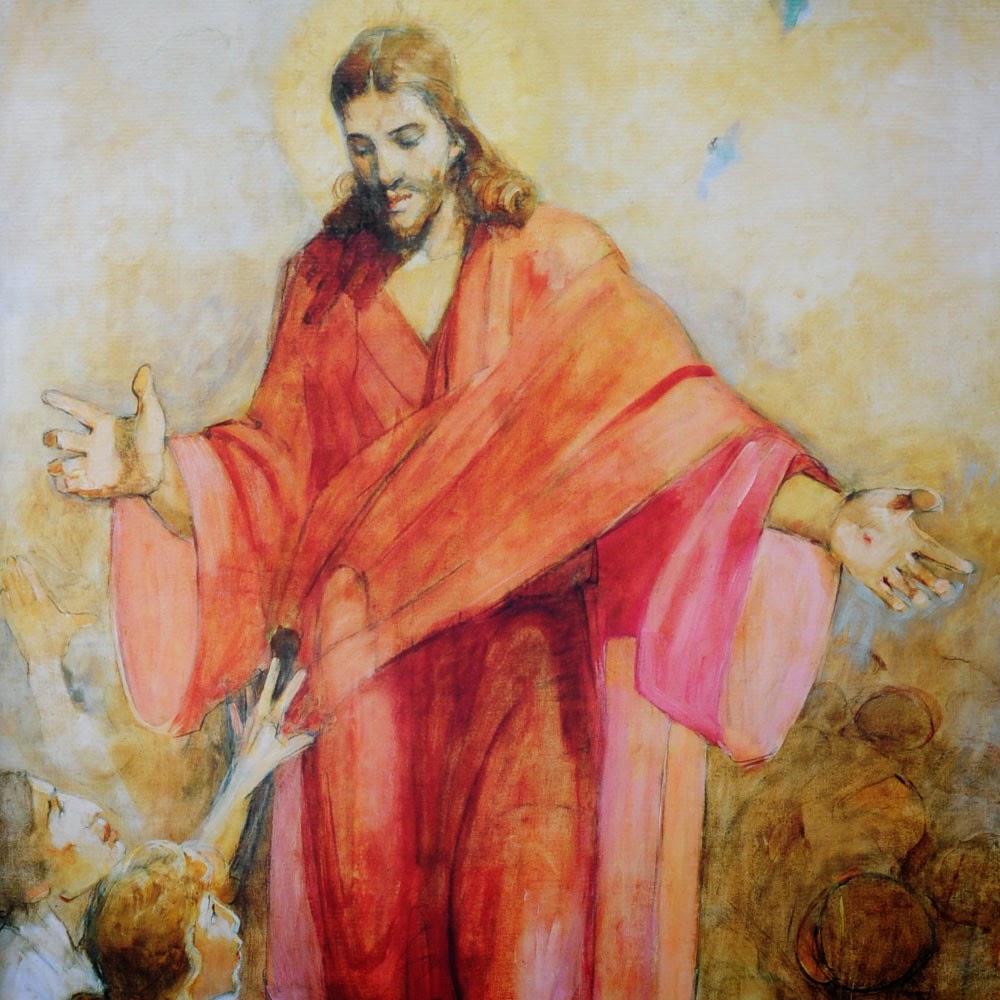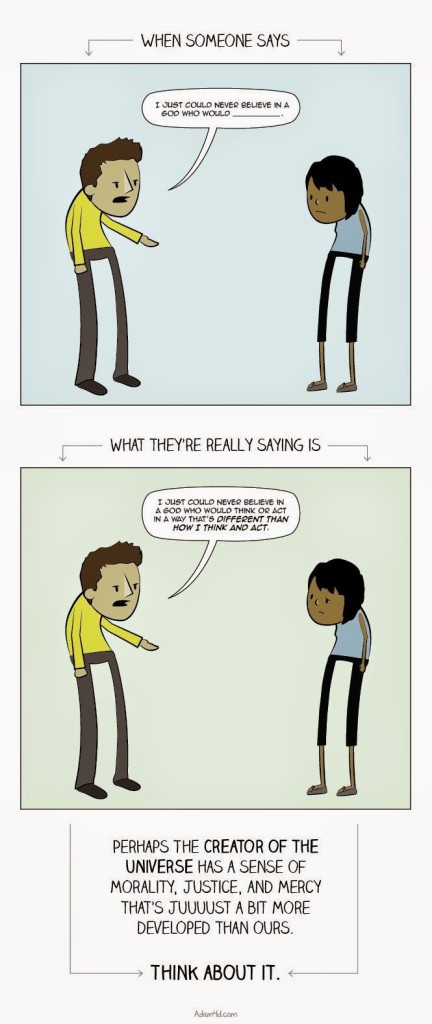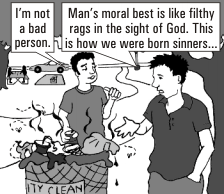“Enlarge the Place of Thy Tent”
Isaiah 54–56; 63–65
LDS manual: here
Reading
Finally, we’re into the third of our three Isaiahs. Trito-Isaiah (as he’s known) likes writing about the destruction and death that will characterise the end times, but along the way, he writes some scriptures that Mormons like because they’re about church and stuff.
First up: Why did God abandon his people? Because he got a little bit angry for a while. But don’t worry, Israel; he’ll totally make it up to you.
54:7 For a small moment have I forsaken thee; but with great mercies will I gather thee.
54:8 In a little wrath I hid my face from thee for a moment; but with everlasting kindness will I have mercy on thee, saith the LORD thy Redeemer.
There’s going to be a thousand years of peace on earth. The hills will be alive with the sound of music — they’ll be singing, of course — and handclaps will be provided by trees.
55:12 For ye shall go out with joy, and be led forth with peace: the mountains and the hills shall break forth before you into singing, and all the trees of the field shall clap their hands.
Trees got hands?
Death to pagans and nature-worshippers, though.
57:3 But draw near hither, ye sons of the sorceress, the seed of the adulterer and the whore.
57:4 Against whom do ye sport yourselves? against whom make ye a wide mouth, and draw out the tongue? are ye not children of transgression, a seed of falsehood.
As kids, we used to joke that this was about French kissing. But this is no joking matter; it’s death for anyone who doesn’t serve Jehovah / Jesus.
60:12 For the nation and kingdom that will not serve thee shall perish; yea, those nations shall be utterly wasted.
There’s currently a debate about whether Christianity or Islam is more violent, and I’d just like to toss these scriptures onto the bad pile for Christianity.

There are some nice ideas promoted along with fasting, though.
58:6 Is not this the fast that I have chosen? to loose the bands of wickedness, to undo the heavy burdens, and to let the oppressed go free, and that ye break every yoke?
58:7 Is it not to deal thy bread to the hungry, and that thou bring the poor that are cast out to thy house? when thou seest the naked, that thou cover him; and that thou hide not thyself from thine own flesh?
Main points for this lesson
The Second Coming?
Through cherry-picking and tormented interpretation, Mormons (and Christians in general) have taken these Jewish scriptures — originally about Jehovah coming to save his people — and have somehow retooled them into a story about the Second Coming of Jesus. From the real lesson manual:
The closing chapters of Isaiah’s record present a beautiful picture of the Millennium, the thousand-year period of peace that will be ushered in by the Savior’s Second Coming.
Which I doubt was on Isaiah’s mind; if anything, he would have been focused on the First Coming.
Here’s a particularly egregious example from the manual:
3. Christ’s Second Coming (Isaiah 63:1–6)
• The Second Coming of the Savior is described in Isaiah 63:1–6. What color will the Savior’s robe be when he comes in his glory? (See Isaiah 63:2; Revelation 19:11–13; D&C 133:46–48.)
Oooh! I know this one from one of those Mormon trivia games. The answer is “red”.
63:2 Wherefore art thou red in thine apparel, and thy garments like him that treadeth in the winefat?
Yay, ten points. Then the manual asks:
What does the red color symbolize? (The blood that he shed when he suffered for our sins in Gethsemane and on the cross.)
No, no, no. You don’t have to read very far to see that it’s not his own blood. In the very next verses, he says it’s the blood of everyone else that he treads on in his fury. That’s right; at the last day he’s going to kill everyone, and he’s going to get their blood all over his clothes!
63:3 I have trodden the winepress alone; and of the people there was none with me: for I will tread them in mine anger, and trample them in my fury; and their blood shall be sprinkled upon my garments, and I will stain all my raiment.
63:4 For the day of vengeance is in mine heart, and the year of my redeemed is come.
63:5 And I looked, and there was none to help; and I wondered that there was none to uphold: therefore mine own arm brought salvation unto me; and my fury, it upheld me.
63:6 And I will tread down the people in mine anger, and make them drunk in my fury, and I will bring down their strength to the earth.
It’s this kind of clueless and dishonest reading that typefies Christian attempts to retcon Jewish scriptures into Christian doctrine. However, it does put a new spin on this Minerva Teichert painting.
God’s ways are not your ways, and your ways suck
Here’s a scripture about the sabbath that’s definitely in the Mormon Top 40.
58:13 If thou turn away thy foot from the sabbath, from doing thy pleasure on my holy day; and call the sabbath a delight, the holy of the LORD, honourable; and shalt honour him, not doing thine own ways, nor finding thine own pleasure, nor speaking thine own words:
58:14 Then shalt thou delight thyself in the LORD; and I will cause thee to ride upon the high places of the earth, and feed thee with the heritage of Jacob thy father: for the mouth of the LORD hath spoken it.
It seems that on the Sabbath, you’re supposed to do the things God wants. Fine and dandy. But there’s something troubling here. According to Isaiah, you’re not supposed to find your own pleasure, do your own ways, or even say your own words. Isn’t this kind of odd? There’s an assumption here that doing things your way is wrong. If you want something, it’s either wrong or inconsequential.
And this is something that I was constantly told: “You want the wrong thing, but God wants the right thing for you. Don’t do your thing; do his thing.” You are wrong, and your desires are wrong. And in this way, you’re taught to mistrust your own instincts about what is right, to second-guess your innate human sense of right and wrong, and replace it with whatever the church says.
I don’t think this is so. I think I want good things. More so than God, in fact; I want people to be kind, have a nice life, get enough to eat, and God wants to bespatter his clothes in the blood of heathens.
Just to continue this theme, here’s what I think is #3 on the list of Worst Scriptures of All Time:
55:8 For my thoughts are not your thoughts, neither are your ways my ways, saith the LORD.
55:9 For as the heavens are higher than the earth, so are my ways higher than your ways, and my thoughts than your thoughts.
I’m counting this scripture as one of the worst for a couple of reasons. First, it has the aforementioned “God is good, you suck” meme. But second, it’s so often used as a thought-blocker. If God’s ways are not our ways, then we can’t rely on our own intuitions for how a god would do things. And that means that if something in church history or church doctrine is absurd, contradictory, or just morally repugnant, it doesn’t matter — God does things different! It excuses everything, and there’s nothing more to say about the matter.
But, the Christian says, what’s wrong with the idea that God knows more about morality than we do? Aren’t we really just demanding that he conform to our way of morality?
Well, let me respond this way: I’m just a regular human, with regular human morality, and even I can see that God’s way of doing things is fucked up.
If these are his ways, then I want no part of them. I am more moral than the being that’s described in the Bible.
The big news at the time of this writing is that the church has released an anonymous essay about polygamy in Nauvoo and Kirtland. This is the most overt admission from the Church that Joseph Smith married 14-year-old girls, and other men’s wives.
I love this bit:
Although the Lord commanded the adoption—and later the cessation—of plural marriage in the latter days, He did not give exact instructions on how to obey the commandment.
Isn’t that just like Jehovah? It’s important enough for him to send an angel with a flaming sword to force Joseph to fuck a teen, but when it comes to details of implementation, he’s like, “Eh, do whatever.” What a colossal doofus!
(“Mental note to Myself: Do a better job when explaining who’s supposed to be president of the church after Joseph.”)
I discussed this essay with a Latter-day Saint, and they gave the expected rationales:
- This isn’t new information.
- It happened a long time ago.
- The important thing is that they stopped polygamy.
But the ultimate thought-blocker was:
- I don’t understand why Heavenly Father would do that, but I’m sure I will when I get up there.
And that was really the end of the discussion. You’re dealing with a hyper-intelligent being who you can’t possibly comprehend. So don’t try. Essentially, it’s like saying “A wizard did it. Don’t think about it. A wizard did it.”
Out of all the people God could have chosen to found his church, why did he pick a known swindler and story-teller like Joseph Smith? Someone who he knew in advance would bed 14-year-olds, mother-daughter pairs, and other men’s wives — in short, someone who he knew would act like, to all appearances, a 19th century sex guru? Why would he go to all the trouble of making his church look dodgy? Well, God’s ways are higher than your ways. There’s no inconsistency or flat-out con job that you can’t excuse with this idea.
The irony here is that it’s this claim that God is super-human that is meant to distract us from noticing that his church and his modus operandi are actually very human. Everything we see about the Morg is exactly what we should expect to see if humans were running it. The problem is not that God’s ways are higher than our ways, but that his ways mirror ours too closely. We should expect more.
Everything you do is terrible
This one is a favourite scripture for the Pentecostals I’ve met:
64:6 But we are all as an unclean thing, and all our righteousnesses are as filthy rags; and we all do fade as a leaf; and our iniquities, like the wind, have taken us away.
Again, same old story. No matter what you could ever do, it would still be awful. If you’re going to be worth anything, it won’t be because of anything you do. It’ll be because you attached yourself to someone else.
Have a look at these graphics that Christians use to illustrate this point.
Ask: How do they make you feel about your efforts? Do they encourage you to do your best? Or do they encourage you to shrink into reliance on someone besides yourself? What effect might this have on your self-esteem? Why would it be beneficial to a church for its members to feel helpless in their own efforts?
Possible answer: The helplessness engendered by this idea keeps you coming back for more.
This is not an idea that builds self-reliant people. It creates broken people.
On reflection, I should point out that Mormons aren’t that big on this scripture, probably because it rubs up against their ideas on the importance of personal righteousness. I actually never heard this scripture until I got into the mission field. So this criticism belongs more to other sorts of Christian folk.
Additional teaching ideas
Stakes
The lesson is big on stakes. The manual even helpfully says:
If you use the attention activity, bring a tent stake.
This is if no one has seen a tent stake before, or in case a vampire shows up to Sunday School.
For the lesson manual, Isaiah’s exhortation to “enlarge the place of thy tent” means: missionary work!
Isaiah’s Counsel
- Stretch the tent curtains and lengthen the cords.
- Strengthen the tent stakes.
What We Can Do
- Serve as full-time missionaries; share the gospel with friends and neighbors.
- Strengthen our local stakes.
I’m having a bit of a beef with missionary work these days. The old slogan is “Every member a missionary”, but in my experience, very few missionaries or members are familiar with the more uncomfortable areas of church history. That Joseph Smith used a magical rock in a hat to translate the Book of Mormon, or even that he had multiple wives, isn’t on their radar. The new essays, anonymous and unannounced, haven’t penetrated into the awareness of the membership.
What that means is that people are serving missions — sacrificing time, money, energy, and opportunity — for a church they scarcely know, and without full knowledge of what they’re representing. Full, informed consent is still lacking.
Common phrases
I noticed two phrases in this reading that have worked their way into our lexicon.
Game. Which phrase actually appears in the Bible?
- There is no rest for the wicked.
- There is no rest for the weary.
- There is no peace for the wicked.
Answer: None of them! Here’s the actual scripture.
57:21 There is no peace, saith my God, to the wicked.
Yes, it’s always the prepositions that trip people up. This is a bit of evidence to show how prepositions have changed since the King James Translation of 1611.
The phrase “holier than thou” also appears in this reading. Jehovah / Jesus is talking about the kind of people that really piss him off.
65:5 Which say, Stand by thyself, come not near to me; for I am holier than thou. These are a smoke in my nose, a fire that burneth all the day.
I hear ya, Jehovah.
Male lactation
Finally, a look at what Israel’s diet will consist of in the Millennium.
60:16 Thou shalt also suck the milk of the Gentiles, and shalt suck the breast of kings: and thou shalt know that I the LORD am thy Saviour and thy Redeemer, the mighty One of Jacob.
Probably a metaphor. Yeah, that’s it.







Recent Comments